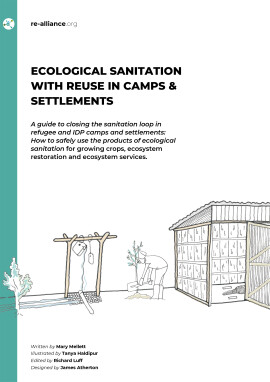
The Challenges of Urban Ecological Sanitation
Lessons from the Erdos Eco-Town Project, China
Arno Rosemarin, Jennifer McConville, Amparo Flores, Zhu Qiang
The need for improved sanitation around the world is becoming a crisis, and the situation is particularly critical in urban and peri-urban areas in developing countries. Here the population is growing rapidly, and where sanitation is provided, the means to treat and dispose of waste safely is neglected, with huge environmental and public health consequences. Sanitation solutions are needed that are safe for the user and interlinked with other urban services which can treat waste as a resource. This book describes an attempt to create modern, multi-storey urban dwellings that incorporate ecological sanitation into their design, resulting in a clean living space, and deriving safe agricultural inputs from human organic waste. The book highlights the experience of implementing the Erdos Eco-Town Project in Inner Mongolia, China. This remains the largest urban project of urine-diversion dry toilets in the world and describes the technical design, daily operation and maintenance, costs and benefits compared to conventional systems, as well as the challenges in achieving acceptability with users. Published in association with Stockholm Environment Institute.
Published: 2012
Pages: 116
eBook: 9781780447674
Paperback: 9781853397684
Hardback: 9781853397677
| Prelims (Figures, Acronyms, About the authors, Preface) | |||
|---|---|---|---|
| 1. Introduction | |||
| 2. Designed to close the loop | |||
| 3. Operations and maintenance | |||
| 4. Research and development | |||
| 5. Social acceptance | |||
| 6. Lessons learned | |||
| Back Matter (Annex 1. Job descriptions of the project experts, Annex 2. Cost-benefit analysis of the EETP ecological sanitation system, Acknowledgements, Notes, References) |
Arno Rosemarin
Arno Rosemarin is with the Stockholm Environment Institute.
Jennifer McConville
Jennifer McConville is with the Stockholm Environment Institute.
Amparo Flores
Amparo Flores is with the Centre for Sustainable Development, Cambridge University.
Zhu Qiang
Zhu Qiang is Former Director and Chief Engineer and Research Professor of the Gansu Research Institute for Water Conservancy China.
Alternative Sanitation and Strategic Directives for the Well Water Security in Cotonou (Benin) and Lomé (Togo)
Vodounon, Henri S. Totin
Azalou-Tingbé, Emilia M.
Houedakor, Koko Z.
Amoussou, Ernest
Nantob, Mafobatchie
Adoho, Gloria A.
Odoulami, Léocadie
Journal of Water Resource and Protection, Vol. 13 (2021), Iss. 09 P.675
https://doi.org/10.4236/jwarp.2021.139036 [Citations: 2]The potential contribution of urine source separation to the SDG agenda – a review of the progress so far and future development options
Larsen, Tove A.
Gruendl, Harald
Binz, Christian
Environmental Science: Water Research & Technology, Vol. 7 (2021), Iss. 7 P.1161
https://doi.org/10.1039/D0EW01064B [Citations: 41]The Sensory Anthropocene
Otter, Christopher
Environmental Humanities, Vol. 17 (2025), Iss. 1 P.1
https://doi.org/10.1215/22011919-11543463 [Citations: 0]Crossfire: Can ‘admitting failure’ help the WASH sector learn and improve its work?
Stephen Jones, Stephen Jones
Nicola Greene, Nicola Greene
Waterlines, Vol. 32 (2013), Iss. 2 P.100
https://doi.org/10.3362/1756-3488.2013.011 [Citations: 0]Evaluation of a closed-loop sanitation system in a cold climate: a case from peri-urban areas of Mongolia
Uddin, Sayed Mohammad Nazim
Li, Zifu
Mahmood, Ibrahim B
Lapegue, Jean
Adamowski, Jan Franklin
Donati, Pier Francesco
Huba, Elisabeth Maria
Mang, Heinz-Peter
Avirmed, Buyanbaatar
Cheng, Shikun
Environment and Urbanization, Vol. 27 (2015), Iss. 2 P.455
https://doi.org/10.1177/0956247815584539 [Citations: 6]new concept regarding the selection of sewerage systems and natural treatment of municipal wastewaters
Covaliov, Victor
Ungureanu, Dumitru
Duca, Gheorghe
Covaliova, Olga
Romanciuc, Lidia
JOURNAL OF ENGINEERING SCIENCE, Vol. 30 (2023), Iss. 1 P.128
https://doi.org/10.52326/jes.utm.2023.30(1).11 [Citations: 0]L’émergence d’un commun en matière d’assainissement urbain : les toilettes sèches séparatives en habitat participatif
Joveniaux, Aurélie
De Gouvello, Bernard
Legrand, Marine
Flux, Vol. N° 124-125 (2021), Iss. 2 P.27
https://doi.org/10.3917/flux1.124.0027 [Citations: 5]




